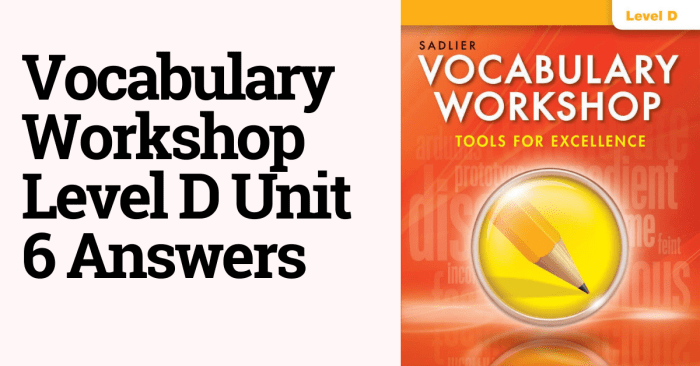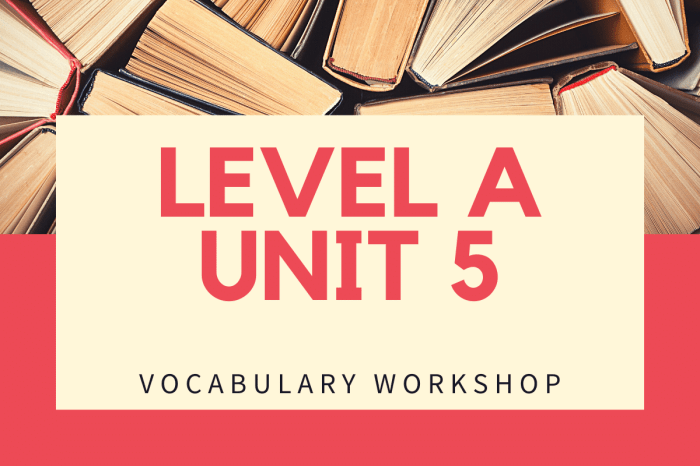Embark on a linguistic adventure with Vocabulary Workshop Level A Unit 6 Answers, a comprehensive guide designed to elevate your vocabulary and unlock the richness of the English language. This invaluable resource provides a wealth of strategies, activities, and assessments to empower you in building a robust vocabulary that will serve you well in academic, professional, and personal contexts.
Our meticulously crafted guide offers a holistic approach to vocabulary development, addressing its significance, types, and the myriad benefits it bestows. We delve into effective strategies for expanding your lexical repertoire, sharing proven techniques for retention and exploring the diverse resources available to support your vocabulary-building journey.
Vocabulary Introduction

Vocabulary refers to the total stock of words in a language that a person knows and uses. It is an essential aspect of communication, allowing us to express our thoughts and ideas clearly and effectively. There are different types of vocabulary, including active vocabulary (words we use regularly in speaking and writing) and passive vocabulary (words we understand when we hear or read them, but don’t use as often).
Expanding our vocabulary brings numerous benefits. It enhances our ability to communicate more precisely, express complex ideas, and understand a wider range of texts. It also improves our cognitive abilities, such as memory and problem-solving skills.
Vocabulary Building Strategies
Building vocabulary requires consistent effort and the use of effective strategies. One approach is to read widely, exposing ourselves to a variety of texts and genres. This allows us to encounter new words in context and learn their meanings through their usage.
Another strategy is to use flashcards or spaced repetition systems (SRS). These tools help us memorize new words by presenting them at increasing intervals, which reinforces our retention. Additionally, we can use online resources like dictionaries and thesauruses to look up unfamiliar words and explore their synonyms and antonyms.
Vocabulary in Context
Using vocabulary in context is crucial for effective communication. When we use words in their appropriate contexts, we ensure that our message is clear and unambiguous. For example, the word “affect” means “to influence or have an effect on,” while “effect” means “a result or consequence.”
Using these words correctly in context avoids confusion and enhances the quality of our communication.
Vocabulary Assessment
| Method | Description |
|---|---|
| Multiple-choice tests | Present a list of options and ask students to choose the correct definition or usage. |
| Fill-in-the-blank exercises | Provide sentences with missing words and ask students to fill in the blanks with appropriate vocabulary. |
| Writing assignments | Ask students to write essays or paragraphs using specific vocabulary words, demonstrating their understanding and usage. |
Regular assessment helps track progress, identify areas for improvement, and motivate students to continue expanding their vocabulary.
Vocabulary Activities
- Word games (e.g., Scrabble, crossword puzzles)
- Vocabulary charades or Pictionary
- Creating and sharing vocabulary lists with peers
- Using vocabulary apps that provide interactive exercises and quizzes
These activities make vocabulary learning engaging and enjoyable, fostering a positive attitude towards language acquisition.
Vocabulary Resources
| Resource | Description |
|---|---|
| Online dictionaries (e.g., Merriam-Webster, Oxford English Dictionary) | Provide definitions, pronunciations, and usage examples. |
| Thesaurus.com | Offers synonyms, antonyms, and related words to expand vocabulary. |
| Vocabulary apps (e.g., Quizlet, Magoosh) | Offer interactive exercises, games, and personalized learning plans. |
These resources provide convenient and accessible tools for vocabulary development.
Vocabulary Development Plan, Vocabulary workshop level a unit 6 answers
- Set realistic goals: Determine the number of new words to learn each week or month.
- Identify areas for improvement: Focus on specific areas where vocabulary needs strengthening.
- Create a personalized learning plan: Choose strategies and resources that align with learning style and goals.
- Track progress: Regularly review and assess vocabulary knowledge to monitor growth.
- Stay motivated: Engage in activities that make learning enjoyable and rewarding.
A personalized vocabulary development plan ensures targeted and effective vocabulary expansion.
Popular Questions: Vocabulary Workshop Level A Unit 6 Answers
What is the significance of vocabulary development?
Vocabulary development is crucial for effective communication, comprehension, and critical thinking. It enables you to express yourself clearly, understand complex ideas, and engage in meaningful discussions.
How can I effectively expand my vocabulary?
There are numerous strategies for expanding your vocabulary, including reading widely, using flashcards, practicing active recall, and engaging in discussions that challenge your linguistic abilities.
What resources are available to support my vocabulary-building efforts?
A variety of resources are available, such as dictionaries, thesauruses, online vocabulary builders, and mobile applications. These tools can provide definitions, synonyms, antonyms, and usage examples to enhance your vocabulary learning.
